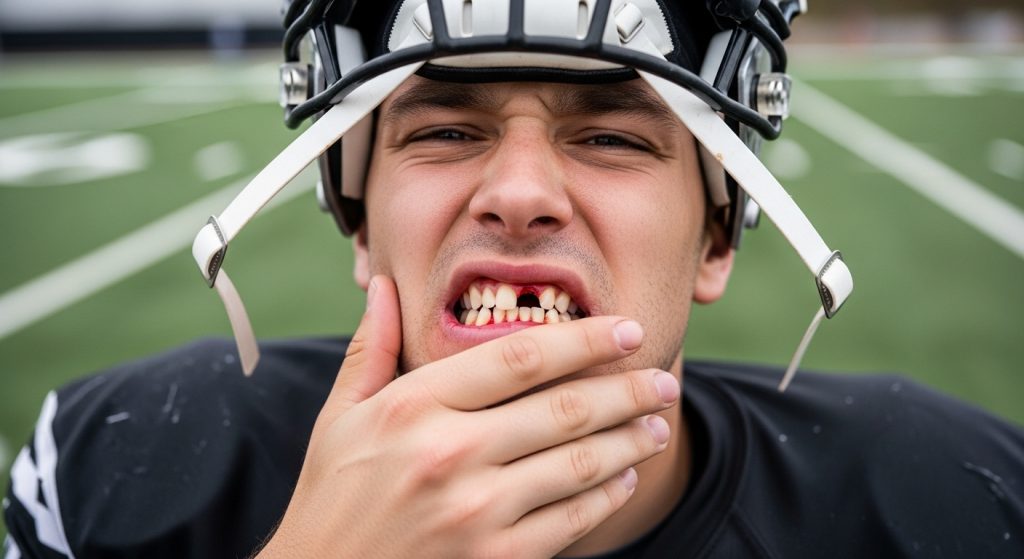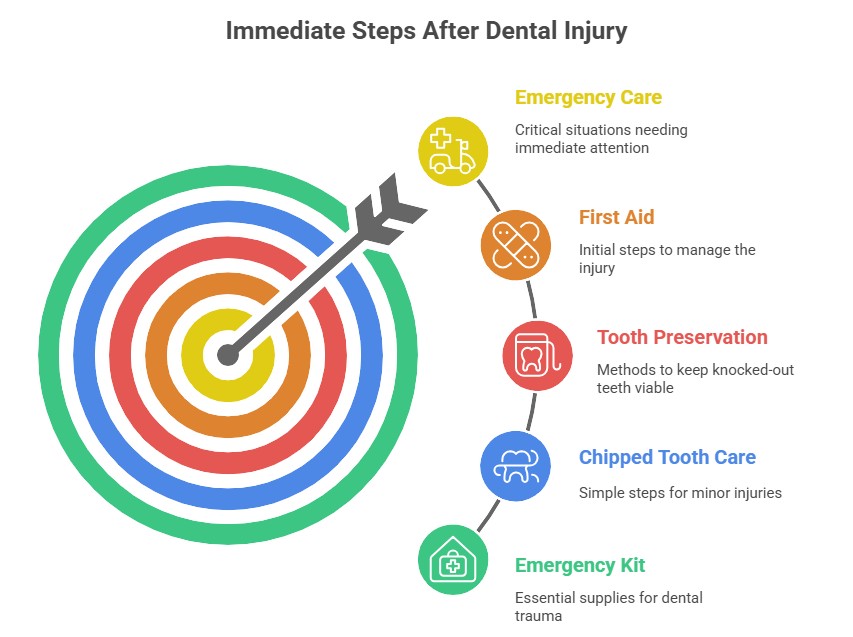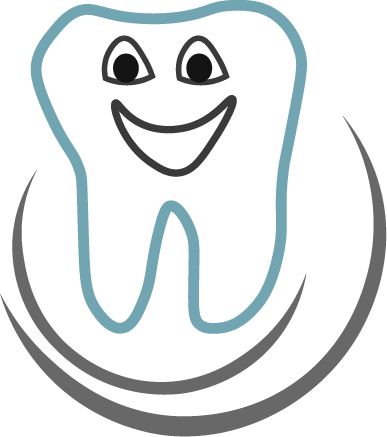Sports are thrilling; we love the rush of a competitive game! But while you’re focused on scoring the winning goal, are you also thinking about sports related dental injuries? Probably not. Yet, a sudden hit to the face or an unexpected fall can harm your teeth in an instant! The good news? These injuries are often preventable, and when they do happen, an emergency dentist will save the day (and your tooth!).
In this guide, we will explore the most common sports-related dental problems, the steps to take in an emergency, and the treatments dentists provide to help athletes smile again.
Common Sports-Related Dental Injuries
Sports-related dental injuries are unfortunately a common accident among athletes. If an accident occurs, knowing what to do immediately can significantly increase the chances of saving your tooth. The most common sports-related issues are knocked-out teeth and chipped or broken teeth. Both situations require fast and professional attention.

Knocked-Out Teeth (Avulsion)
A knocked-out permanent tooth is when an entire permanent tooth is dislodged from its socket, which is a true dental emergency where time is absolutely critical! According to the American Association of Endodontists, the best chance of saving the tooth occurs when it is reimplanted within 30 minutes of the accident. After just an hour, the odds drop significantly.
If this happens, handle the tooth only by the crown (the chewing surface) and never by the root. If the tooth is dirty, gently rinse it with water, but avoid scrubbing it. The ideal immediate action is to place the tooth back into its socket gently. If you cannot do that, store it in milk, a specialized tooth preservation solution, or even in your mouth (next to the cheek) to keep it from drying out. In any case, contact a dentist immediately or book an emergency appointment as soon as possible.
Chipped or Broken Teeth
These sports related dental injuries vary widely in severity. A small chip on the enamel might be mostly cosmetic and easily fixed. However, a deeper crack that exposes the inner layers of the tooth, known as the dentin or the pulp, is a serious problem. This untreated fractured tooth can quickly lead to extreme sensitivity, infection, or further structural failure.
Your dentist must assess the type of fracture based on the AAE trauma guidelines and determine whether it’s an uncomplicated chip or a complicated break involving the sensitive nerve (pulp) to decide on the best treatment plan to restore your tooth’s health and appearance.
Immediate Steps After Sports Related Dental Injuries
When a dental injury happens on the field, staying calm and responding quickly makes all the difference in whether a tooth can be saved or fully repaired. What you do in those first few minutes is crucial!

First Aid for Dental Trauma
If an entire tooth has been knocked out (avulsed), handle it only by the crown, never by the root. If it’s dirty, gently rinse it with milk or saline; avoid soap or scrubbing it aggressively. If possible, carefully replace the tooth in its socket immediately and have the athlete bite down gently to hold it in place. If reinsertion isn’t possible, you must keep the tooth moist in milk or a specialized tooth-preservation solution until you reach the dentist.
For a chipped or broken tooth, simply have the athlete rinse their mouth with water, apply a cold compress to the outside of the injured area to minimize swelling, and make sure they avoid chewing on that side until professional care is available. An “emergency dental kit” (gauze, saline, tooth storage medium, disposable gloves) on the sidelines is a practical tool recommended in sports clinics.
When to Seek Emergency Care
A knocked-out tooth is a critical emergency and needs attention within 30 to 60 minutes to maximize the chance of survival. Other serious issues requiring urgent treatment include fractures that expose the inner layers of the tooth, any loose or displaced teeth (luxation), and uncontrolled bleeding. Even if the injury seems minor, such as a small chip, you should still see a dentist within 24 hours. A seemingly simple chip can mask deeper structural damage that needs immediate attention to prevent future complications.
Contact Us for Help!
Do you have questions about sports-related dental injuries?
Contact us now for the best available treatment to save your tooth and smile!
Preventing Dental Injuries in Sports
When it comes to dental trauma, prevention is always better than treatment! The good news is that most sports related dental injuries are entirely avoidable simply by taking the proper precautions.
The Role of Mouthguards
Mouthguards are the single most effective piece of equipment for preventing sports related dental injuries. They work by cushioning impacts, protecting the teeth and gums, and significantly reducing the risk of painful soft-tissue injuries. While even a “boil-and-bite” guard is better than nothing, we highly recommend a custom-fitted mouthguard made by a dentist.
Custom guards provide superior comfort and the most precise fit, meaning athletes are far more likely to wear them consistently throughout the game or practice, which translates to reliable protection.
Safe Sports Practices
Equipment isn’t the only factor; safe play is also essential. Coaches should teach proper techniques that reduce the potential for collisions and accidental contact. Athletes should also make a habit of never using their mouths to grip equipment, such as sticks or straps. For high-risk sports, wearing helmets and face shields further lowers the chance of serious injury.
Finally, teams that prepare a detailed dental emergency action plan before the season starts are always better equipped to protect their athletes when an accident inevitably occurs.
Treatment Options for Sports Related Dental Injuries
Once an athlete reaches the dental clinic, the goal is to stabilize the injury and restore the tooth’s function and appearance. The specific treatment plan dentists use will always depend on the type and severity of the damage.
Restorative Procedures
For a knocked-out tooth, the primary procedure is to replant it into the socket and then stabilize it using a dental splint. If the internal pulp (nerve) of the tooth has been damaged, a root canal treatment will likely be necessary. Teeth that are chipped or broken are commonly repaired using procedures such as bonding, applying veneers, or fitting a protective crown, depending on the extent of the fracture.
For severe injuries, we may need to perform surgical repositioning or other complex procedures on oral surgery candidates to restore both the full function and natural appearance of the smile.
Long-Term Care
Healing is a process that extends beyond the initial repair. We require regular follow-up visits to carefully monitor the tooth for potential long-term complications, such as infection, root resorption, or the tooth fusing to the bone. In the unfortunate event that a tooth cannot be saved, we suggest replacement options, including dental implants or bridges, to fully restore the athlete’s smile. Additionally, after any treatment, we provide customized preventive guidance to help the athlete significantly reduce their risk of future injury.
Protect Your Game: Final Takeaways on Dental Safety
In the world of sports, quick action is key. If a dental injury occurs, your immediate response determines whether the tooth can be saved. The best defense is prevention: always wear a custom-fitted mouthguard for cushioning impact and preventing painful chips, fractures, and soft tissue damage.
In the event of an accident, contact a reliable dentist or a dental clinic to access urgent care, from stabilizing a displaced tooth to complete restoration with bonding, crowns, or implants.
FAQ
-
What to do if a tooth is knocked out?
Pick it up by the crown, rinse gently with milk or saline, and reinsert it if possible. If not, store it in milk and see a dentist immediately.
-
Can a chipped tooth wait?
No. Even small chips should be checked within 24 hours to prevent cracks from spreading or infection from developing.
-
How soon should I see a dentist?
Immediately for knocked-out, displaced, or deeply fractured teeth. Within 24 hours for minor chips or cracks.
-
Are mouthguards required?
Rules vary by sport, but dental experts strongly recommend mouthguards for all contact and high-risk activities.
-
Will CDCP cover sports injury repair?
The Canadian Dental Care Plan coverage depends on eligibility and the specific services needed. Some emergency and restorative treatments are included, but it’s best to confirm with your provider.
Have you experienced sports related dental injuries? What type of treatment was suitable for your injury, or are you still looking for a better fit? Share your thoughts in the comments and join the conversation.





